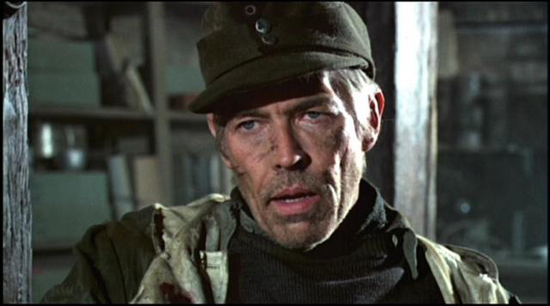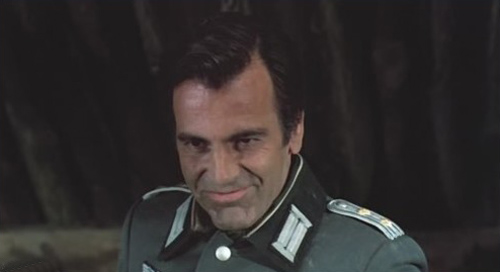Orson Welles described it as the greatest war film ever made and Quentin Tarantino acknowledged it as a key influence on his decision to make Inglorious Basterds. But to frame Sam Peckinpah’s Cross of Iron in terms of influence wielded over successive generations of action film-makers (such as Tarantino, John Woo, Michael Mann, Park Chan-Wook and the like) would be to understate the power of this film. Peckinpah’s unique ability to frame action is undeniable but action is not the core of the film. Tarantino may have been wowed by the visual artistry and technical brilliance on display, Welles’ admiration was likely for the deeper themes and nuances.
Although ostensibly based upon a little known novel by Willi Heinrich, The Willing Flesh (titled The Cross of Iron in the USA), Peckinpah wrote the script and encouraged copious amounts of improvisation, rewriting as he went. A famously heavy drinker, Peckinpah was, at the time, experiencing one of his serious relapses into alcoholism and pill abuse, sleeping three hours and drinking three bottles of vodka or slivovitz per day. In addition he had a tempestuous relationship with producer Wolf Hartwig, a former pornography producer and (he boldly claimed) panzer commandant. Things were further complicated by the Yugoslavian crew who, still smarting from recent memories of Nazi atrocities, hated Hartwig’s guts and did everything they could to disrupt his work.
The result is a complex beast that reflects all of Sam Peckinpah’s attitudes to manliness. Throughout all of his films, he explored his belief that men revel in conflict and, in Straw Dogs particularly, he expressed that only through violence can a man truly protect what he holds to be valuable.
As a war film Cross of Iron is authentic, violent, visceral and exciting. As an anti-war statement it is moving, politically astute and increasingly relevant as we find ourselves in an era of on-going conflict. There is some irony in the fact that its anti-war message is delivered with Peckinpah’s eye for artful violence and an almost lascivious love of war imagery, but ultimately they are essential qualities if such a movie is to be successful in the delivery of its key themes. Peckinpah makes no concessions either, framing his own directing credit in the opening titles in the frozen image, and sound, of an explosion. He leaves viewers in no uncertainty regarding the content to come. Things will explode and bullets will fly.

34 years later it is difficult to gauge the impact on then audiences of Peckinpah’s style of directing but consideration must be given to the age of Cross of Iron. These days we are swamped with CGI clones and slow-mo action is the scourge of modern films, but back then Peckinpah was a trailblazer and his work had a huge impact on popular culture, even to the point where he was pastiched by the Monty Pythons in their Salad Days sketch. More recently the war film was ‘redefined’ for the twenty-first century by Saving Private Ryan, an effort which, now that the violence levels have ceased to shock, is as emotionally unsubtle as an episode of Buffy (as well as being as nauseatingly schmaltzy as any other Spielberg blockbuster).
Cross of Iron‘s chief contemporary in 1977 was Richard Attenborough’s A Bridge Too Far, a film which acknowledged the mistakes and follies of senior leadership in war but fell short of portraying the fighting men as anything other than caricatures, choosing instead to tell its story through the eyes of the officers.
Peckinpah’s only war film is about the fighting man, the universal soldier. As the opening titles roll images of proud youths bearing swastika flags and innocent children craning their necks at rallies to catch a glimpse of the Fuhrer are juxtaposed with newsreel footage of marching German infantry and armoured divisions thundering over countryside. The titles are accompanied by Ernest Gold’s bombastic rendition of ‘Hanschen Klein’, a traditional German song about Little Hans, a boy who leaves home to see the world and on his return as a grown man he is not recognised by his family, so much has he changed, except for his mother who sees her son in his eyes. As the song progresses the picture of the proud war machine gives way to footage of emaciated German survivors captured after the retreat from Stalingrad, a radically different picture from the close formation marching war machine shown moments before and punctuated by the utterly beaten visage of General Paulus, taken from Russian newsreels following his surrender when 91,000 German soldiers entered captivity after an estimated 740,000 had become casualties of the campaign. This vivid title sequence successfully establishes the world in which Steiner exists in the space of two minutes and remains one of the most utilitarian yet artful titles in existence.
In 1943, the defeat of Stalingrad is a year in the past and the ragged German divisions are in full retreat. Corporal Steiner (James Coburn) is an embittered professional with the unfortunate knack of being a first class soldier and figure of hope for those about him. Steiner’s status as a totem constantly brings him into the focused gaze of the senior echelons for whom he has nothing but contempt. His priorities are the men with whom he exists and bleeds on a daily basis. Unfortunately this puts him on a collision course with the newly arrived, Iron Cross-seeking Captain Stransky (Maximilian Schell). Stransky’s only interest in the front is prestige and the opportunity to guild his laurels as quickly as possible before returning to Paris.
Once back in their bunker quarters we see what these men are about. Coburn’s weathered features are perfect for Steiner’s tired countenance and his performance ties together those of the ensemble – all distinctive and distinguished German actors. The old euphemism that an actor has ‘an interesting face’ (meaning he or she is bloody ugly) is sadly these days a rare phenomenon as most actors seem to come from the same acting schools and have the same bland, pretty features. Cross of Iron is a wonderful throwback to the days of real actors and just about every face on show is distinctly interesting, lending the whole show an air of utter authenticity. These are not the immaculately turned out parade ground Wehrmacht soldiers hitherto always seen in war movies. Nor are they the clean cut, handsome young actors sporting serious expressions and fake thousand yard stares that marred Saving Private Ryan and more recently HBO’s The Pacific. Steiner’s platoon is a motley collection of killers and survivors, combatants in a brutal campaign ingrained with the filth and trauma of years of fighting.

Captain Stransky on the other hand is crisply dressed and manicured, a manipulative and arrogant schemer whose pompous disregard for the rank and file is perhaps typical of the average aristocratic Prussian career officer of the time. Maximilian Schell’s performance is pitch perfect and is perfectly encapsulated in an intimate scene in his bunker during which, whilst being pampered, he holds court and entraps his adjutant Triebig, and his orderly Kepler, into admitting their homosexuality. Stransky’s triumphant response is chilling. Contrast this with the scenes in Steiner’s bunker where Steiner is a fatherly presence and the relationships with and between the men are evidently deep, close and vital.
Stransky’s attempt to win Steiner over with a promotion is met with obvious disdain and impatience. The confrontation between the two radically different men sets in motion the film’s key arc, the conflict not between nations but between the common man and his upper class masters and the viewer is left in no doubt as to which party Peckinpah identifies with most closely. Few British war films ever trod such a left-field line. The conflict between the two has terrible consequences, borne as always by the poor bloody infantry and the film climaxes in a unique and memorable fashion which will disappoint many but stands as a brilliant reminder of the utter absurdity of the whole war.
Cross of Iron is, like all of Peckinpah’s films, a story of men in conflict. But what he appreciates and advances so strongly is that manly men are not lone killing machines a la the modern action hero, nor are they the glassy eyed, po-faced victims of modern war films. Peckinpah’s soldiers are engaged in a bromantic tragedy and the overall theme is one of humanist regret.
Peckinpah’s career and health were at the start of a steady decline when he made this, possibly his most personal film, and he would only make two more before his death from heart disease in 1984. If Peckinpah infused Cross of Iron with one overriding message it is dim, nihilistic and encapsulated in an exchange between David Warner’s alcoholic, nicotine stained Captain Kiesel and James Mason’s aged Colonel Brandt. When Brandt asks of his adjutant, "What shall we do when we lose the War?" Kiesel sardonically answers "Prepare for the next one."


